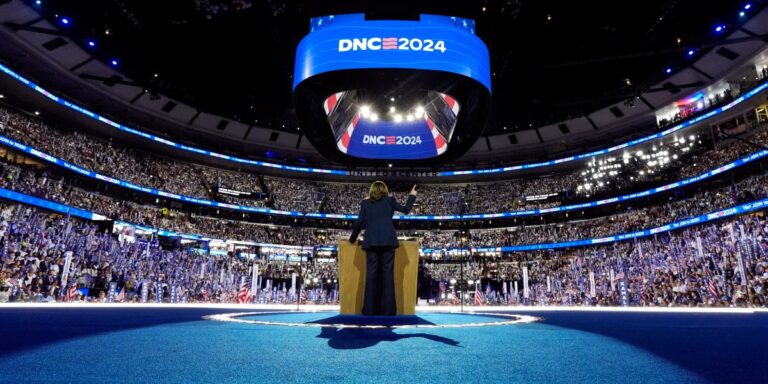Vice President Harris pledged on the stage at the Democratic National Convention to put workers’ concerns above those of corporations, and if she sticks to it despite well-funded opposition from Silicon Valley, she will find committed allies among tech workers.
In recent years, the tech industry has seen the normalization of massive layoffs and brutal union busting carried out by executives with ties to both parties. Additionally, many of the biggest innovations to come out of Silicon Valley in the past decade were explicitly aimed at cutting labor costs and circumventing labor laws. This led to a race to the bottom that began with outsourcing “gigification” and ultimately replacing as much of the human workforce as possible with generative AI. These cost-cutting measures not only impact the salaries of tech workers, but also the safety and quality of tech products with vast user bases.
Some executives are becoming more comfortable publicly expressing anti-labor views. In a recent conversation at X Spaces, President Trump casually praised Musk for mass layoffs of employees in response to strikes. Earlier this year, Amazon CEO Andy Jassy argued that workers would be “disempowered” if they unionized, thus violating federal labor law. In the area of automation, executives from Nvidia, Duolingo, Klarna, Cisco and IBM have recently revealed their intentions to use AI to replace human workers.
But through government and grassroots movements, workers and labor advocates are fighting back. Under the Biden-Harris Administration, the Department of Justice, the Federal Trade Commission, and the National Labor Relations Board have been relentless in pursuing tech companies and their executives for abuses of corporate power and labor violations. The Department of Justice has fought for fair employment practices; it fined Apple $25 million for employment discrimination. Lina Khan’s FTC has tried to ban non-compete agreements, a staple of at-will employment contracts at tech companies. Non-compete agreements have a chilling effect on workers’ ability to seek better wages and benefits. Moreover, the FTC has consistently considered labor impacts when evaluating mergers. This consideration goes beyond the well-worn consumer welfare standard and seeks to ensure that competition is favorable to consumers as well as workers. And the National Labor Relations Board has targeted outsourcing by more strictly enforcing “joint employer” rules that make it harder for companies to use subcontracting as a way to avoid minimum wage and other liabilities.
On the ground, we workers have been moving the dialogue and action forward by simultaneously forming, joining, and strengthening unions. The Campaign to Organize Technology Workers (CODE-CWA) has been at the forefront of our industry organizing efforts at companies ranging from Act Blue, a fundraising platform that supports many Democratic candidates, to the top-tier giant that is Microsoft. Our unions have filed petition after petition against employers, and the NLRB has worked tirelessly to enforce laws that our bosses violate, winning worker victories across the board. In fact, the NLRB has been so successful that some technology companies, including Amazon and SpaceX, are trying to gut the NLRB, arguing that its longstanding role in governing labor relations is unconstitutional.
After struggling to make progress and enduring setbacks as labor Davids under the thumb of corporate Goliaths, the past few years have been a real silver lining, and we are determined to keep fighting and keep winning, with or without the support of the next President.
Will either candidate continue to advance for workers? The answer is not so clear. Both camps have tech rich lining up to argue for less strict regulation. While Trump-backed venture capitalists Andreessen and Ben Horowitz euphemistically cited “bad government policies” as the biggest threat to the tech industry, Harris’ Silicon Valley powerbrokers are not actively fighting for workers. In fact, Hoffman said the FTC’s Khan is “waging war on American business” and urged Harris to fire him. It’s not yet clear if Harris shares the same views as her billionaire supporters, but it’s certain that she’s after their money. A recent Harris campaign fundraiser in San Francisco brought in $13 million from a guest list full of tech executives. The vice president is also reportedly negotiating more directly with tech bosses, sending aides to meet with cryptocurrency industry leaders and venture capital firms. Harris’s industry ties are longstanding and often personal: She is known for her close ties to former Facebook COO Sheryl Sandberg and Laurene Powell Jobs, and her brother-in-law is Uber’s chief legal officer.
Harris’ team is in discussions and exploring options, but she has yet to announce her approach to economic policy, regulation, innovation, and labor. It would be wise to raise funds first without making any promises. But Harris should try to attract our votes, not just the financial support of her bosses. Tech workers have been the most progressive energy in recent memory. During the 2020 campaign, Bernie Sanders proudly voiced his solidarity with workers against his billionaire bosses. Tech workers supported Sanders, donating more to Bernie than any other presidential candidate in the primaries, nearly twice as much as Elizabeth Warren, the second most popular candidate among this group. If Harris truly commits to the cause, she could harness that kind of power in November.


